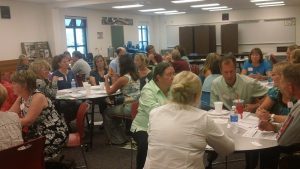 I was honored to submit a blog post to Philanthropy Northwest entitled The Northwest Art of Bringing People Together. Full text is provided below.
I was honored to submit a blog post to Philanthropy Northwest entitled The Northwest Art of Bringing People Together. Full text is provided below.
I received an invitation to our nation’s capital last month for a gathering of 100 practitioners working on high school dropout prevention across the country. The stated purpose of the meeting was to reflect on progress and to explore new ideas. Needless to say, I was super excited about meeting interesting people, sharing what we’re learning and considering what’s next. That’s exactly how we structure Graduation Matters Montana, our statewide initiative that’s increasing the number of students who graduate from high school ready for their next steps in life. Each summer, with support from the Dennis & Phyllis Washington Foundation, First Interstate Bank and other local funders, we convene more than 200 teachers, school staff, students, and community and business leaders to learn from one another’s efforts, reflect on successes and celebrate how far we’ve come, together.
So, I was disappointed when the day-long meeting in D.C. turned out to be an an every-hour-on-the-hour “sit and git” — panelists presenting recent data, research and the occasional inspirational story. I kept waiting for the point when we’d be introduced to each other, or invited to talk in small groups about what we were hearing and how it connects — or doesn’t connect — to our own experiences.
Unfortunately, that did not happen. Instead: meeting over, nametags tossed, a nice new tote bag to add to my collection.
As I flew home to Montana, I thought about how many meetings I’ve attended in D.C. and elsewhere, where this is the way people gather. “Experts” talk to us as if we are blank slates, agendas are set and tight, and it’s totally random if you meet someone and make a helpful new connection.
Then I thought about how we’ve designed Graduation Matters Montana, in which we invite people to explore what we’re learning and to co-create new approaches. In six short years, we’ve reached the highest graduation rate on state record, with over 50 Montana communities now hosting a GMM initiative. The art of bringing people together has been central to this work, and I wondered: “Is it a Northwestern thing?”
Different Perspectives, Common Values
I’ve written previously about the five essential learnings of GMM, and they all relate to the way we convene people and trust that communities have many of the answers they seek. For instance, two of our learnings are that people in community share common values (as we say, “No one is pro-dropout”), although they may have differing perspectives.
Our common values include concerns for a safe and healthy community, for families to grow strong and for children to have opportunities to thrive. Our differing perspectives I liken to the tale of the blind men, who come upon an elephant, and argue over what they have found. “It’s wide and soft and floppy!” says the man touching the elephant’s ear. “No no! It is hard and sharp and cool,” says the man beside a tusk.
Of course, they are both right. And yet, they are incomplete in their understanding of the beast. It is only through careful discovery and conversation that they begin to understand the whole picture — to gain a richer understanding of the complexity of their situation. In GMM, we none of us — school administrators, students, community members, certainly not government officials in Helena — can fully understand the challenges of students not thriving in our schools. It is only through bringing together people with different perspectives and experiences that we can begin to understand more fully our opportunities for change.
So back to being in the Northwest. I think the relational aspects of being western are deeply ingrained in the way we live: deals are done on a handshake; we’re only as good as our word; don’t fence me in but I’ll help mend yours if you need a hand. That may sound prosaic, but in our small towns, modest economies and vast open spaces, we know that we need to trust one another, to have each other’s back, and to be resourceful.
That’s why relationships matter, why we need to pool our efforts to get things done.
Under One Sky
I’m interested in connecting with other Northwesterners who are in the business of bringing people, organizations and communities together to explore new ways of doing our work. Let’s meet Under One Sky this September in Missoula; I’ve been assured that Philanthropy Northwest’s conference style is much more than a “sit and git!”
In the meantime, please reach out to me if you’d like to start a conversation about your work, what you’re learning and how we can continue to build on the strength of our communities and our region, together.
